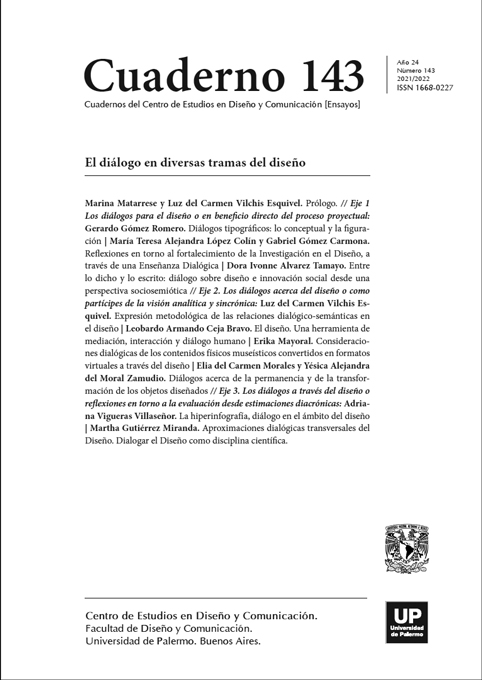Diálogos tipográficos: lo conceptual y la figuración
Abstract
The study of design in its multiple manifestations is posed –in particular cases– through antinomies; a confrontation of opposing concepts that expose their meaning in contrasting association. From the binomial: the conceptual and the figuration, dialogic reflections are established with the conceptual configuration of the linguistic sign and the figurative typographic representation, an antinomy proposed as a didactic strategy for the compression of two concepts frequently used in graphic design and that now It is exposed with the own resources of the typography. The conceptual configuration is illustrated with ten words with which there is a dialogue through the typographic signs to show their meaning or some of their meanings, without incorporating figurative elements that support the meaning. On the other hand, the figurative typographic representation postulates expressions with the morphological means of the typographic fonts available in the design editing programs; a level of dialogue with the design where the subject interprets the figuration in a more digestible way. This last section illustrates the concept of figuration with project steps of a single job. So far –at least in Mexico– there is no known study that addresses conceptual construction and typographic figuration in epistemological correspondence with dialogic relations with design, so this article aims to be a valuable reference document for the community of graphic designers, visual communicators and the general public.
References
Acaso, M. (2006) El lenguaje visual. España: Paidós.
Dascal, M. (1999) Filosofía del lenguaje II. Pragmática. Madrid: Trotta.
Diccionario Akal de Filosofia. (2004) España: ediciones Akal.
Fontana, R. (2012) Ganarse la letra. México: Universidad Autónoma metropolitana.
Lizarazo Arias, D. (2009) Iconos, figuraciones, sueños. Hermenéutica de las imágenes. México: Siglo XXI.
Martínez Leal, L. (1990) Treinta siglos de tipos y letras. México: Tilde
Real Academia Española. (1970) Diccionario de la Lengua Española. España: Espasa-Calpe.
Rodríguez González, A. (2005) Logo ¿Qué?. México: Siglo XXI Editores. Ruder, E. (1983) Manual de diseño tipográfico. Barcelona: Gustavo Gili
Prieto Castillo, D. (2005) Diseño y comunicación. México: Ediciones Coyoacán.
Soriano, P. (2004) La mediación figurativa como historia del habitar. Argentina: No-buko.
Vilchis Esquivel, L. del C. (2006) Relaciones dialógicas en el diseño gráfico. México: Publicaciones ENAP. Vilchis Esquivel, L. del C. (2004) Semiosis Hermenéutica de lenguajes gráficos no lineales. México: Imagen siete.
Vilchis Esquivel, L. del C. (2014) Metodología del diseño. México: Designio.
Los autores/as que publiquen en esta revista ceden los derechos de autor y de publicación a "Cuadernos del Centro de Estudios de Diseño y Comunicación", Aceptando el registro de su trabajo bajo una licencia de atribución de Creative Commons, que permite a terceros utilizar lo publicado siempre que de el crédito pertinente a los autores y a esta revista.


